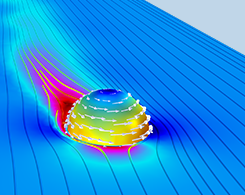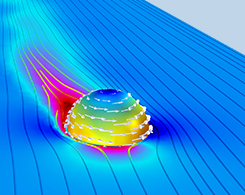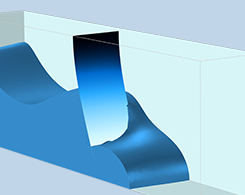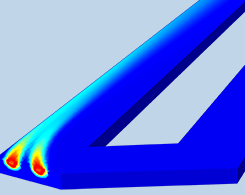Fluid & Heat Blog Posts

Your Guide to Meshing Techniques for Efficient CFD Modeling
Learn how to use a variety of meshing tools for your CFD analyses, including mapped mesh, unstructured quad mesh, triangular mesh, tetrahedral mesh, swept mesh, boundary layer mesh, and more.

How to Set Up a Mesh in COMSOL Multiphysics® for CFD Analyses
As a flow mechanics specialist preparing a mesh for CFD analysis, the geometry supplied by a CAD team is often exactly what you do not want. So, what do you do?

Does It Matter Which Ball the FIFA World Cup™ Teams Practiced With?
In an attempt to determine what type of soccer ball is best to prepare for the FIFA World Cup™, we set up a backyard experiment involving a leaf blower, level, and a few soccer balls.

Optimizing Combustion Particle Control in an Electric Filter Design
To optimize the design of an electrostatic filter, researchers from Switzerland used multiphysics modeling, validating their results by comparing them to experimental data.

Terminal Velocity, Drag Coefficients, and FIFA World Cup™ Predictions
Is it possible to predict the winners of the FIFA World Cup™? We forgo consulting a psychic and instead analyze the terminal velocity and drag coefficients of different balls with CFD simulation.

Modeling Free Surfaces in COMSOL Multiphysics® with Moving Mesh
You can model free liquid surfaces that do not undergo topology changes using moving mesh functionality in the COMSOL® software. Here’s a thorough guide on how to do so.

Analyzing Multiphase Flow in an Airlift Loop Reactor Benchmark Model
This blog post features a benchmark model of an airlift loop reactor that validates the use of CFD simulation for analyzing multiphase flow.

Two Methods for Modeling Free Surfaces in COMSOL Multiphysics®
We take you through 2 methods for modeling free surfaces in the COMSOL® software: the level set and phase field methods. Learn how to use each method and their benefits.
